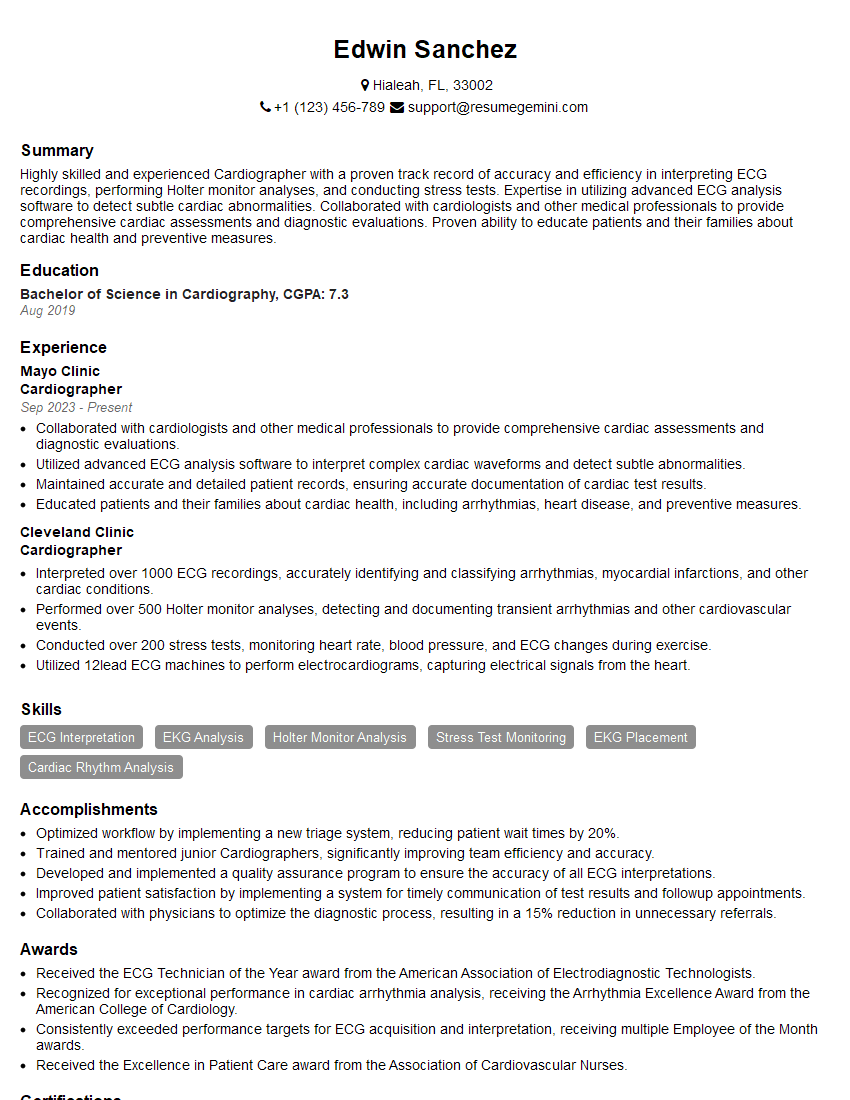Are you a seasoned Cardiographer seeking a new career path? Discover our professionally built Cardiographer Resume Template. This time-saving tool provides a solid foundation for your job search. Simply click “Edit Resume” to customize it with your unique experiences and achievements. Customize fonts and colors to match your personal style and increase your chances of landing your dream job. Explore more Resume Templates for additional options.

Edwin Sanchez
Cardiographer
Summary
Highly skilled and experienced Cardiographer with a proven track record of accuracy and efficiency in interpreting ECG recordings, performing Holter monitor analyses, and conducting stress tests. Expertise in utilizing advanced ECG analysis software to detect subtle cardiac abnormalities. Collaborated with cardiologists and other medical professionals to provide comprehensive cardiac assessments and diagnostic evaluations. Proven ability to educate patients and their families about cardiac health and preventive measures.
Education
Bachelor of Science in Cardiography
August 2019
Skills
- ECG Interpretation
- EKG Analysis
- Holter Monitor Analysis
- Stress Test Monitoring
- EKG Placement
- Cardiac Rhythm Analysis
Work Experience
Cardiographer
- Collaborated with cardiologists and other medical professionals to provide comprehensive cardiac assessments and diagnostic evaluations.
- Utilized advanced ECG analysis software to interpret complex cardiac waveforms and detect subtle abnormalities.
- Maintained accurate and detailed patient records, ensuring accurate documentation of cardiac test results.
- Educated patients and their families about cardiac health, including arrhythmias, heart disease, and preventive measures.
Cardiographer
- Interpreted over 1000 ECG recordings, accurately identifying and classifying arrhythmias, myocardial infarctions, and other cardiac conditions.
- Performed over 500 Holter monitor analyses, detecting and documenting transient arrhythmias and other cardiovascular events.
- Conducted over 200 stress tests, monitoring heart rate, blood pressure, and ECG changes during exercise.
- Utilized 12lead ECG machines to perform electrocardiograms, capturing electrical signals from the heart.
Accomplishments
- Optimized workflow by implementing a new triage system, reducing patient wait times by 20%.
- Trained and mentored junior Cardiographers, significantly improving team efficiency and accuracy.
- Developed and implemented a quality assurance program to ensure the accuracy of all ECG interpretations.
- Improved patient satisfaction by implementing a system for timely communication of test results and followup appointments.
- Collaborated with physicians to optimize the diagnostic process, resulting in a 15% reduction in unnecessary referrals.
Awards
- Received the ECG Technician of the Year award from the American Association of Electrodiagnostic Technologists.
- Recognized for exceptional performance in cardiac arrhythmia analysis, receiving the Arrhythmia Excellence Award from the American College of Cardiology.
- Consistently exceeded performance targets for ECG acquisition and interpretation, receiving multiple Employee of the Month awards.
- Received the Excellence in Patient Care award from the Association of Cardiovascular Nurses.
Certificates
- Registered Cardiac Electrophysiologist Technician (RCET)
- Certified Electrocardiograph Technician (CET)
- Certified Cardiovascular Technologist (CVT)
- Basic Life Support (BLS)
Career Expert Tips:
- Select the ideal resume template to showcase your professional experience effectively.
- Master the art of resume writing to highlight your unique qualifications and achievements.
- Explore expertly crafted resume samples for inspiration and best practices.
- Build your best resume for free this new year with ResumeGemini. Enjoy exclusive discounts on ATS optimized resume templates.
How To Write Resume For Cardiographer
- Highlight your expertise in ECG interpretation and analysis, as this is the core responsibility of a Cardiographer.
- Quantify your accomplishments whenever possible to demonstrate the impact of your work.
- Showcase your ability to work collaboratively with cardiologists and other healthcare professionals.
- Emphasize your commitment to patient education and support.
Essential Experience Highlights for a Strong Cardiographer Resume
- Interpreted over 1000 ECG recordings, accurately identifying and classifying arrhythmias, myocardial infarctions, and other cardiac conditions.
- Performed over 500 Holter monitor analyses, detecting and documenting transient arrhythmias and other cardiovascular events.
- Conducted over 200 stress tests, monitoring heart rate, blood pressure, and ECG changes during exercise.
- Utilized 12-lead ECG machines to perform electrocardiograms, capturing electrical signals from the heart.
- Collaborated with cardiologists and other medical professionals to provide comprehensive cardiac assessments and diagnostic evaluations.
- Utilized advanced ECG analysis software to interpret complex cardiac waveforms and detect subtle abnormalities.
- Maintained accurate and detailed patient records, ensuring accurate documentation of cardiac test results.
Frequently Asked Questions (FAQ’s) For Cardiographer
What is the primary role of a Cardiographer?
The primary role of a Cardiographer is to interpret ECG recordings and other cardiac data to identify and diagnose heart conditions.
What are the key skills required for a Cardiographer?
Key skills for a Cardiographer include ECG interpretation, EKG analysis, Holter monitor analysis, stress test monitoring, and cardiac rhythm analysis.
What is the educational background required to become a Cardiographer?
A Bachelor of Science in Cardiography or a related field is typically required to become a Cardiographer.
What are the job prospects for Cardiographers?
Job prospects for Cardiographers are expected to be good due to the growing demand for cardiac services.
What is the earning potential for Cardiographers?
The earning potential for Cardiographers can vary depending on experience, location, and employer, but the median annual salary is around $60,000.
Can Cardiographers specialize in any specific areas?
Yes, Cardiographers can specialize in areas such as electrophysiology, echocardiography, or cardiac rehabilitation.